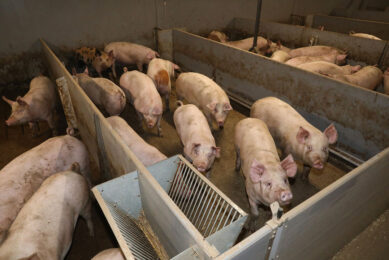Chinese create transgenic pig resistant to CSF

The use of transgenic pigs can reduce economic losses related to Classical Swine Fever (CSF), according to Chinese researchers.
The researchers, most of them attached to Jilin University, published about their findings in the peer-reviewed journal PLOS Pathogens. In their article, the researchers described how they combined RNA interference (RNAi) technology and CRISPR/Cas9 technology to create these transgenic pigs, which then could deal better with Classical Swine Fever, also known as hog cholera in the United States.
Creating anti-CSFv transgenic pigs
The team of researchers described how antiviral small hairpin RNAs (so-called ‘shRNAs’) were selected and then inserted at the porcine Rosa26 (pRosa26) locus via the CRISPR/Cas9-mediated knock-in strategy. The team produced anti-CSFv transgenic pigs by somatic nuclear transfer (SCNT).
Notably, the researchers wrote, in vitro and in vivo viral challenge assays further demonstrated that these transgenic pigs could effectively limit the replication of CSFv and reduce CSFv-associated clinical signs and mortality, and disease resistance could be stably transmitted to the F1-generation.

Read more about Classical Swine Fever and other health issues in our Health Tool
Improved resistance to CSF viral infection
Concluding, the researchers stated that the work demonstrated that RNAi technology combining CRISPR/Cas9 technology offered the possibility to produce a transgenic animal with improved resistance to viral infection. The researchers therefore added that the strategy may be useful for future antiviral research.
The scientific paper was written by Zicong Xie,; Daxin Pang, Hongming Yuan, Huping Jiao, Chao Lu, Kankan Wang, Qiangbing Yang, Mengjing Li, Xue Chen, Tingting Yu, Xinrong Chen, Zhen Dai, Yani Peng, Xiaochun Tang, Zhanjun Li, Tiedong Wang, Li Li, Liangxue Lai, Hongsheng Ouyang, all attached to Jilin University, China; and Huancheng Guo and Changchun Tu, Academy of Military Medical Sciences, Changchun, Jilin province, China.











